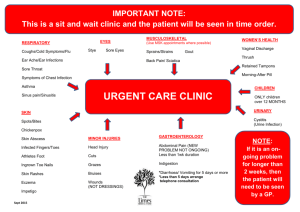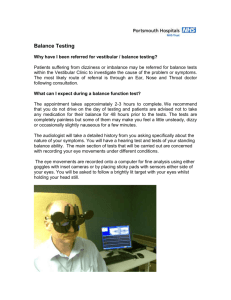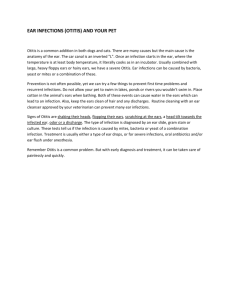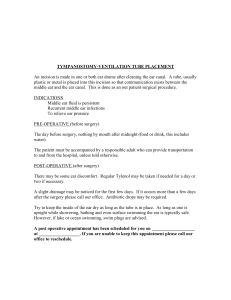Middle Ear Infection (Otitis Media)
advertisement
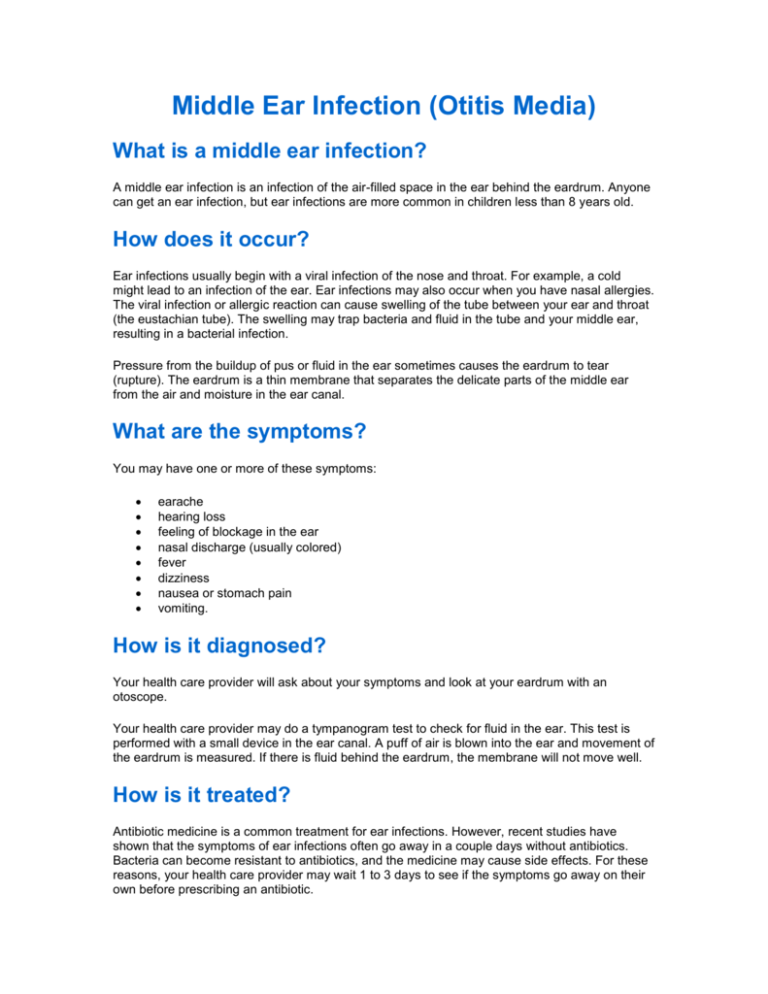
Middle Ear Infection (Otitis Media) What is a middle ear infection? A middle ear infection is an infection of the air-filled space in the ear behind the eardrum. Anyone can get an ear infection, but ear infections are more common in children less than 8 years old. How does it occur? Ear infections usually begin with a viral infection of the nose and throat. For example, a cold might lead to an infection of the ear. Ear infections may also occur when you have nasal allergies. The viral infection or allergic reaction can cause swelling of the tube between your ear and throat (the eustachian tube). The swelling may trap bacteria and fluid in the tube and your middle ear, resulting in a bacterial infection. Pressure from the buildup of pus or fluid in the ear sometimes causes the eardrum to tear (rupture). The eardrum is a thin membrane that separates the delicate parts of the middle ear from the air and moisture in the ear canal. What are the symptoms? You may have one or more of these symptoms: earache hearing loss feeling of blockage in the ear nasal discharge (usually colored) fever dizziness nausea or stomach pain vomiting. How is it diagnosed? Your health care provider will ask about your symptoms and look at your eardrum with an otoscope. Your health care provider may do a tympanogram test to check for fluid in the ear. This test is performed with a small device in the ear canal. A puff of air is blown into the ear and movement of the eardrum is measured. If there is fluid behind the eardrum, the membrane will not move well. How is it treated? Antibiotic medicine is a common treatment for ear infections. However, recent studies have shown that the symptoms of ear infections often go away in a couple days without antibiotics. Bacteria can become resistant to antibiotics, and the medicine may cause side effects. For these reasons, your health care provider may wait 1 to 3 days to see if the symptoms go away on their own before prescribing an antibiotic. Your provider may recommend a decongestant (tablets or a nasal spray) to help clear the eustachian tube. This will help relieve pressure in the middle ear. For pain take a nonprescription pain reliever such as acetaminophen (Tylenol) or ibuprofen. How long will the effects last? In most cases you should feel better in 2 to 3 days. If you are taking an antibiotic and your eardrum has not returned to normal when your provider examines you again, you may need to take a different antibiotic or other medicine. After 2 weeks, you should feel normal again. What can I do to take care of myself? Follow your health care provider's instructions. If you are taking an antibiotic, take all of it, even when the symptoms have gone away. To help relieve pain, put a warm moist washcloth or a hot water bottle over the ear. If you have discharge from your ear, you can wipe it away and loosely plug the ear with cotton to catch further drainage. If you have a lot of fluid and pus draining from your ear, the eardrum has probably ruptured and there may be a more serious infection. Ask your health care provider how to handle ear discharge. If you have a fever: Stay in bed until your temperature has fallen below 100°F (37.8°C). Then become as active as you comfortably can. Ask your provider if you can take aspirin, acetaminophen, or ibuprofen to control your fever. Anyone under the age of 21 with a viral illness should not take aspirin because of the increased risk of Reye's syndrome. Keep a daily record of your temperature. Call your health care provider if you have: a temperature over 102 degrees F (38.9 degrees C) that persists even after you take acetaminophen, aspirin, or ibuprofen a severe headache or pain around the ear swelling around the ear convulsions or decreased alertness dizziness worsening of your hearing weakness of one side of your face. Keep all your appointments. Your health care provider will want you to have one or more follow-up exams until all signs of inflammation and infection have disappeared. How can I prevent an ear infection from occurring? If you tend to get ear infections often, ask your health care provider if you need to be checked for allergies. Also ask if you should see your provider when you have an upper respiratory infection, such as a cold. Getting treatment for allergies or colds may help prevent ear infections.
